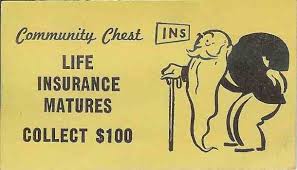 As part of a sale transaction, the board of “Gold Kist” (more widely known as Pilgrim’s Pride), decided to abandon certain securities for no consideration. For tax purposes, the company then reported a $98.6 million ordinary loss. Pilgrim’s Pride Corp. v. Commissioner of Internal Revenue, No. 14-60295 (Feb. 25, 2015). The IRS contended that this was a capital loss, rather than an ordinary loss, creating a tax deficiency of close to $30 million. The Court agreed with the company, finding: “By its plain terms, [26 U.S.C.] § 1234A(1) applies to the termination of rights or obligations with respect to capital assets (e.g. derivative or contractual rights to buy or sell capital assets). It does not apply to the termination of ownership of the capital asset itself.” In rejecting a contrary view of the statute, Judge Elrod gives a powerful summary of several canons of construction: “We disagree. Congress does not legislate in logic puzzles . . . “
As part of a sale transaction, the board of “Gold Kist” (more widely known as Pilgrim’s Pride), decided to abandon certain securities for no consideration. For tax purposes, the company then reported a $98.6 million ordinary loss. Pilgrim’s Pride Corp. v. Commissioner of Internal Revenue, No. 14-60295 (Feb. 25, 2015). The IRS contended that this was a capital loss, rather than an ordinary loss, creating a tax deficiency of close to $30 million. The Court agreed with the company, finding: “By its plain terms, [26 U.S.C.] § 1234A(1) applies to the termination of rights or obligations with respect to capital assets (e.g. derivative or contractual rights to buy or sell capital assets). It does not apply to the termination of ownership of the capital asset itself.” In rejecting a contrary view of the statute, Judge Elrod gives a powerful summary of several canons of construction: “We disagree. Congress does not legislate in logic puzzles . . . “
Monthly Archives: February 2015
In 2012, the Fifth Circuit remanded a False Claims Act case with the direction: “The district court should determine whether the public disclosures identified in the motion for summary judgment reveal either (i) that Shell was deducting gathering expenses prohibited by program regulations, or (ii) that this type of fraud was so pervasive in the industry that the company’s scheme, as alleged, would have been easily identified.” Little v. Shell Exploration, 690 F.3d 282 (5th Cir. 2012). On remand, the district court again granted summary judgment for the defense, and a displeased Fifth Circuit reversed. Little v. Shell Exploration II, No. 14-20156 (Feb. 23, 2015, unpublished).
The Court found: “Not only did the district court fail to follow these explicit instructions, but the analysis set out in its short opinion is so broad, conclusory, and unsupported by the summary judgment record that we are compelled to conclude it did not comply with our instructions.” On the merits, the Court held that “the district court erred with respect to every category of supposed public disclosures.” The Court went on to order reassignment to a different district judge on remand, concluding: ” Facing a lengthy and detailed summary judgment record, the district judge issued a five-page opinion with few
citations to either record evidence or relevant legal authority—not surprising given that neither the summary judgment evidence nor the law support the conclusions he reached.”
The Fifth Circuit has now docketed the federal government’s appeal of the recent ruling that enjoins President Obama’s immigration program; meanwhile, in the district court, the plaintiffs’ response to the federal government’s motion to stay pending appeal is due by March 2.
 Pennzoil has several well-known trademarks for its motor oil products. It sued Miller Oil, which operates a quick-stop oil change facility in Houston, for infringing those marks. Miller defended on the ground that after its original contract with Pennzoil lapsed in 2003, Pennzoil’s dealings with Miller amounted to an acquiescence in Miller’s use of the marks. The district court agreed but the Fifth Circuit reversed. Pennzoil-Quaker State Co. v. Miller Oil & Gas Operations, No. 13-20558 (Feb. 23, 2015).
Pennzoil has several well-known trademarks for its motor oil products. It sued Miller Oil, which operates a quick-stop oil change facility in Houston, for infringing those marks. Miller defended on the ground that after its original contract with Pennzoil lapsed in 2003, Pennzoil’s dealings with Miller amounted to an acquiescence in Miller’s use of the marks. The district court agreed but the Fifth Circuit reversed. Pennzoil-Quaker State Co. v. Miller Oil & Gas Operations, No. 13-20558 (Feb. 23, 2015).
The Court thoroughly reviewed its own, and other Circuits’, approaches to the elements of the acquiescence defense, as well as the relationship of that defense to laches. The Court concluded that an element of the defense was undue prejudice to the defendant from the plaintiff’s conduct, which usually involves “some form of ‘business building.'” Here, the defendant’s expenses associated with removing Pennzoil’s marks did not  satisfy that requirement, because they would not be related to business expansion. While the defendant’s claim about a “loss of identity” from removing Pennzoil’s marks could qualify, on this record: “Miller Oil does not proffer evidence of, for example, changes in its customer base, higher profits, or new business opportunities it was able to exploit because of the re-brand.” Accordingly, Miller Oil did not meet its burden of proof.
satisfy that requirement, because they would not be related to business expansion. While the defendant’s claim about a “loss of identity” from removing Pennzoil’s marks could qualify, on this record: “Miller Oil does not proffer evidence of, for example, changes in its customer base, higher profits, or new business opportunities it was able to exploit because of the re-brand.” Accordingly, Miller Oil did not meet its burden of proof.
 In Frey v. First National Bank Southwest, No. 13-10375 (Feb. 20, 2015), an appeal that was stayed in deference to the ruling in Mabary v. Home Town Bank, N.A., 771 F.3d 820 (5th Cir. 2014), the Fifth Circuit again affirmed the certification of a class related to notice requirements about ATM fees: “The primary questions with regard to First National’s liability are whether and when First National failed to provide the on-machine fee notice in violation of the EFTA’s requirements during the class period; if so, the appropriate amount of statutory damages; and whether the bank can avail itself of either of the two statutory defenses to liability. The answers to these questions will affect all class member’s claims.”
In Frey v. First National Bank Southwest, No. 13-10375 (Feb. 20, 2015), an appeal that was stayed in deference to the ruling in Mabary v. Home Town Bank, N.A., 771 F.3d 820 (5th Cir. 2014), the Fifth Circuit again affirmed the certification of a class related to notice requirements about ATM fees: “The primary questions with regard to First National’s liability are whether and when First National failed to provide the on-machine fee notice in violation of the EFTA’s requirements during the class period; if so, the appropriate amount of statutory damages; and whether the bank can avail itself of either of the two statutory defenses to liability. The answers to these questions will affect all class member’s claims.”
The Fifth Circuit has withdrawn its high-profile opinion (as to damages) in Forte v. Wal-Mart Stores, which found that civil penalties were not available absent actual damages in a suit under a Texas statutory cause of action about optometry. The controlling issues have now been certified to the Texas Supreme Court.
 Superior MRI Services sued for tortious interference with contract; the defendant argued that Superior lacked standing because it never acquired rights under the relevant contracts, and the Fifth Circuit agreed. Superior MRI Services, Inc. v. Alliance Imaging, Inc., No. 14-60087 (Feb. 18, 2015). The record showed that P&L Imaging, a bankruptcy debtor, listed “MRI service agreements” on its schedule of assignments to Superior, with an assignment date of October 1, 2011. Superior, however, did not exist as a legal entity until November 28, 2011. No evidence showed that Superior ratified the contract after its formation, and the Court was unwilling to accept Mississippi’s approval of Superior as a vendor as evidence of a ratification. The Court distinguished the recent case of Lexmark, Int’l v. Static Control Components, 134 S. Ct. 1377 (2014), as relating to another aspect of the standing requirement.
Superior MRI Services sued for tortious interference with contract; the defendant argued that Superior lacked standing because it never acquired rights under the relevant contracts, and the Fifth Circuit agreed. Superior MRI Services, Inc. v. Alliance Imaging, Inc., No. 14-60087 (Feb. 18, 2015). The record showed that P&L Imaging, a bankruptcy debtor, listed “MRI service agreements” on its schedule of assignments to Superior, with an assignment date of October 1, 2011. Superior, however, did not exist as a legal entity until November 28, 2011. No evidence showed that Superior ratified the contract after its formation, and the Court was unwilling to accept Mississippi’s approval of Superior as a vendor as evidence of a ratification. The Court distinguished the recent case of Lexmark, Int’l v. Static Control Components, 134 S. Ct. 1377 (2014), as relating to another aspect of the standing requirement.
 Pearl Seas sued Lloyd’s Register North America (“LRNA”) for inadequate performance in certifying a cruise ship (the “Pearl Mist,” seen to the right.) LRNA moved to dismiss on the grounds of forum non conveniens in favor of England, citing a forum selection clause contained in its rules. The district court denied the motion without explanation and the Fifth Circuit reversed in a 2-1 panel opinion. In re Lloyd’s Register North America, Inc.. No. 14-20554 (Feb. 24, 2015), re-released after initial publication as a per curiam opinion on February 18.
Pearl Seas sued Lloyd’s Register North America (“LRNA”) for inadequate performance in certifying a cruise ship (the “Pearl Mist,” seen to the right.) LRNA moved to dismiss on the grounds of forum non conveniens in favor of England, citing a forum selection clause contained in its rules. The district court denied the motion without explanation and the Fifth Circuit reversed in a 2-1 panel opinion. In re Lloyd’s Register North America, Inc.. No. 14-20554 (Feb. 24, 2015), re-released after initial publication as a per curiam opinion on February 18.
The Court held: (1) as in the case of In re: Volkswagen, 545 F.3d 304 (5th Cir. 2008) (en banc), which involved the denial of a motion to transfer venue, mandamus is appropriate in the context of forum non conveniens; (2) it is an abuse of discretion to “grant or deny a[n FNC] motion without written or oral explanation” as to the relevant factors; and (3) the plaintiff was plainly bound by LRNA’s rules under the doctrine of direct-benefit estoppel, since its claim “referenced duties that must be resolved by reference to the classification society’s rules.” (citing Hellenic Inv. Fund v. Det Norkse Veritas, 464 F.3d 514 (5th Cir. 2006)). (A panel reached a similar result in Vloeibare Pret Limited v. Lloyd’s Register North America, Inc., No. 14-20538 (April 16, 2015, unpublished).
A dissent by Judge Elrod argued that the majority’s analysis of direct-benefit estoppel expanded the Court’s prior holdings in two areas — the degree to which the claim incorporated the relevant rules, and the timing of when the plaintiff learns of the rules. The dissent also expressed concern that the substantive claim would not be recognized in England.
The point of division between the majority and dissent — whether an error is “clear” or not — resembles a similar split between the majority and dissent in the mandamus case of In re Radmax, 720 F.3d 285 (5th Cir. 2013), which granted the writ as to the erroneous denial of an “intra-district” motion to transfer venue. Interestingly, Judge Higginson was the dissenter in Radmax, and also dissented from the denial of en banc review of that panel opinion, while here he forms part of the two-judge majority that grants mandamus relief. Judge Smith, who was in the majority of the Radmax panel opinion, is the author of this opinion after its initial release as per curiam.
In the case of In re Deepwater Horizon, the Texas Supreme Court has answered the certified questions raised in a significant insurance case about BP’s coverage related to the Deepwater Horizon disaster. (No. 130670, Tex. Feb. 13, 2015.) The issue is whether BP was an additional insured under policies obtained by Transocean, the operator of the ill-fated rig. Applying Evanston Ins. Co. v. ATOFINA Petrochemicals, Inc., 256 S.W.3d 660 (Tex. 2008), the Court held that “it is possible for a named insured to purchase a greater amount of coverage for an additional insured than an underlying service contract requires,” and that “the scope of indemnity and insurance clauses in service contracts is not necessarily congruent.” From that foundation, the court concluded: “The Drilling Contract required Transocean to name BP as an additional insured only for the liability Transocean assumed under the contract. Accordingly, Transocean had separate duties to indemnify and insure BP for certain risk, but the scope of that risk for either indemnity or insurance purposes extends only to above-surface pollution.”
Monday evening, a district judge in South Texas enjoined President Obama’s immigration program; the full text of his opinion is available here. (The case has the remarkably awkward caption of “Texas v. United States.”) An appeal has not yet been docketed with the Fifth Circuit. As with the recent gay marriage arguments, the makeup of the panel will be critical to the resolution of this extremely important case. The Washington Post story is a good example of the media coverage of the ruling.
Fernando Ramirez died after a beating by security guards at a nightclub. His estate sued the guards and the business that owned the club, as well as subsequent owners, alleging a scheme to hide assets. This lawsuit led to an insurance coverage dispute between the subsequent owners and the CGL carrier at the time of the incident. Colony Ins. Co. v. Price, No. 14-10317 (Feb. 12, 2015, unpublished). The specific allegations against the later owners in the underlying suit are far from clear, and appear to be obscured by broad use of the term “Defendants.” Nevertheless, the district court and Fifth Circuit agreed that these parties were not covered as “employees” under the policy: “Most obviously, the Price Defendants fail to explain how MTP and TOM, a partnership and a limited liability company, can be employees at all, let alone employees who falsely imprisoned Ramirez on October 1, 2008, particularly given that the Petition alleges that they were not formed until December 31 of the following year.”
1. I am speaking at the Dallas Bar Appellate Section meeting on March 19 at the Belo Mansion, with an update on recent Fifth Circuit opinions of general interest.
2. This year’s Super Lawyers nomination deadline is Wednesday, February 18 (two days from now). Take a few minutes to support the publication and your colleagues; the nomination form is here.
The defendants in a wrongful foreclosure case removed and the district court dismissed the borrower’s claims on the pleadings. The Fifth Circuit reversed for jurisdictional reasons. Smith v. Bank of America, No. 14-50256 (revised March 20, 2015, unpublished).
As to diversity jurisdiction, which was based on improper joinder of several defendants, the Court reminded: “[W]hen confronted with an allegation of improper joinder, the court must determine whether the removing party has discharged its substantial burden before proceeding to analyze the merits of the action.”
‘Blanton sued for employment discrimination, and after trial, “[t]here is no question that Blanton was subjected to egregious verbal sexual and racial harassment by the general manager of the Pizza Hut store where he worked.” Blanton v. Newton Associates, Inc., No. 14-50087 (Feb. 10, 2015, unpublished). The issue on appeal was whether the employer had established “the Ellerth/Faragher affirmative defense”; essentially, that the employer acted reasonably to stop the harassment and the employee unreasonably failed to enlist the employer’s aid. The evidence showed a lack of training about the employer’s anti-discrimination policies, and that two low-level supervisors hesitated to report the harassment for fear of retaliation by the general manager, but that “[o]nce Blanton did complain to a manager with authority over the general manager, Pizza Hut completed an investigation and fired her within four days.” Accordingly, the verdict and resulting judgment for the employer was affirmed.
 The issue in Lowman v. Jerry Whitaker Timber Contractors, LLC was whether certain timber companies had vicarious liability for allegedly unlawful logging activities, in DeSoto Parish, Louisiana, in violation of that state’s timber cutting statute. Evidence showed that the loggers sold timber to the mills and in return received a “scale ticket” — a sort of commercial paper that can be bought and sold and allows small loggers immediate access to sale proceeds — which featured a description of the wood. Plaintiffs offered an affidavit from a state investigator who described the defendants’ “prior schemes involving the theft of timber and the falsifying of scale tickets,” and opined that he saw “‘the same pattern’ of activity” here. The Fifth Circuit affirmed summary judgment for the defendants, finding that the evidence showed no connection between the tickets he reviewed and the timber at issue, much less any “right of control or supervision” by the defendants over the loggers. No. 14-30787 (Feb. 10, 2015, unpublished).
The issue in Lowman v. Jerry Whitaker Timber Contractors, LLC was whether certain timber companies had vicarious liability for allegedly unlawful logging activities, in DeSoto Parish, Louisiana, in violation of that state’s timber cutting statute. Evidence showed that the loggers sold timber to the mills and in return received a “scale ticket” — a sort of commercial paper that can be bought and sold and allows small loggers immediate access to sale proceeds — which featured a description of the wood. Plaintiffs offered an affidavit from a state investigator who described the defendants’ “prior schemes involving the theft of timber and the falsifying of scale tickets,” and opined that he saw “‘the same pattern’ of activity” here. The Fifth Circuit affirmed summary judgment for the defendants, finding that the evidence showed no connection between the tickets he reviewed and the timber at issue, much less any “right of control or supervision” by the defendants over the loggers. No. 14-30787 (Feb. 10, 2015, unpublished).
An attorney challenged sanctions and contempt orders on appeal; one of her major points was inability to pay. The Fifth Circuit reminded that inability to pay is a defense to a charge of civil contempt, as to which “[t]he alleged contemnor bears the burden of producing evidence of his inability to comply. Failure to do so waives further consideration of this issue, even in the face of an order that added $100/day for noncompliance. Garrett v. Coventry, No. 14-10525 (Feb. 6, 2015).
 BNSF Railway Co. v. Alstom Transportation presented a challenge to an arbitration award, in a contract dispute about the maintenance of rail cars. No. 13-11274 (Feb. 5, 2015). The Fifth Circuit brushed aside a number of challenges to the arbitrator’s legal analysis, quoting the Seventh Circuit: “As we have said too many times to want to repeat again, the question for decision by a federal court asked to set aside an arbitration award . . . is not whether the arbitrator or arbitrators erred in interpreting the contract; it is not whether they clearly erred in interpreting the contract; it is not whether they grossly erred in interpreting the contract; it is whether they interpreted the contract.”
BNSF Railway Co. v. Alstom Transportation presented a challenge to an arbitration award, in a contract dispute about the maintenance of rail cars. No. 13-11274 (Feb. 5, 2015). The Fifth Circuit brushed aside a number of challenges to the arbitrator’s legal analysis, quoting the Seventh Circuit: “As we have said too many times to want to repeat again, the question for decision by a federal court asked to set aside an arbitration award . . . is not whether the arbitrator or arbitrators erred in interpreting the contract; it is not whether they clearly erred in interpreting the contract; it is not whether they grossly erred in interpreting the contract; it is whether they interpreted the contract.”
 Also, on procedural grounds, the Court rejected a challenge to the propriety of having arbitrated “gateway questions” of arbitrability. The district court had partially vacated the arbitrator’s award, the appellant (successfully) challenged that ruling, and BNSF had considerable latitude to defend it. But the “gateway” argument that arbitration should never have occurred, and that the award should thus be vacated in full, could not be presented on appeal absent a cross-appeal because it “asks for an expansion of the judgment.”
Also, on procedural grounds, the Court rejected a challenge to the propriety of having arbitrated “gateway questions” of arbitrability. The district court had partially vacated the arbitrator’s award, the appellant (successfully) challenged that ruling, and BNSF had considerable latitude to defend it. But the “gateway” argument that arbitration should never have occurred, and that the award should thus be vacated in full, could not be presented on appeal absent a cross-appeal because it “asks for an expansion of the judgment.”
In the press of year-end business, I neglected to cover a notable mandamus opinion in 2014 from the Federal Circuit, In re Google, Inc, No. 2014-147, 2014 WL 5032336 (Oct. 9, 2014). Reminiscent of that Court’s opinion in In re Genentech, 566 F.3d 1338 (2009), and the Volkswagen/Radmax line of cases from the Fifth Circuit, In re: Google addresses the denial of a motion to transfer patent litigation from the Eastern District of Texas.
The district court focused on “each defendant mobile phone manufacturer’s ability to modify and customize” the relevant platform. The Federal Circuit disagreed and granted mandamus relief, emphasizing the “substantial similarity involving the infringement and invalidity issues in all the suits.” That Court also rejected an argument based on the first-filed rule, finding that on these facts, “the equities of the situation do not depend on this argument.” (quoting Kerotest Mfg. Co. v. C-O-Two Fire Equip Co., 342 U.S. 180, 186 n.6 (1952). Concluding with a review of the practical considerations listed by 1404(a), the Court noted that the product at issue was developed in the Northern District of California, and thus the “bulk of the relevant evidence” is there as well.
In an earlier opinion, the Fifth Circuit reversed a summary judgment in favor of an insured, finding a fact issue as to whether late notice caused prejudice to the carrier. “Berkley I,” Berkley Regional Ins. Co. v. Philadelphia Indemnity Ins. Co., 690 F.3d 342 (5th Cir. 2012). After further proceedings, the district court granted summary judgment to the carrier and the Court affirmed. “Berkley II,” Berkley Regional Ins. Co. v. Philadelphia Indemnity Ins. Co., No. 13-51180 c/w No. 14-50099 (Jan. 27, 2015, unpublished). The key issue was whether notice to the broker sufficed to give notice the the carrier; the Court reasoned that even if the broker had a limited agency relationship with the carrier, notice of claims fell outside its scope: “Under the 2002 Agreement, Philadelphia expressly allowed [Agent] to act as an insurance broker and sell Philadelphia policies as Philadelphia’s representative, subject to Philadelphia’s approval. The 2002 Agreement is silent as to whether [Agent] had the ability to accept notice of claims on behalf of Philadelphia. Thus, [Agent] did not have express authority to accept notice of claims.” For the same reasons, an implied agency theory was also rejected.
 The insurance coverage case of Mt. Hawley Ins. Co. v. Advance Products & Systems, Inc. illustrates the recurring differences of opinion between the Fifth Circuit and district courts about contract ambiguity. 14-30068 (Jan. 27, 2015, unpublished). When APS made a claim on its commercial property policy with Mt. Hawley, APS’s recovery was limited by a “coinsurance provision” that applies if it “has not insured the full value of its income.” The parties differed on whether “income” referred to projected or actual net income; the district court found ambiguity, and the Fifth Circuit reversed: “Although APS has a point—the language used in calculating the coinsurance penalty is imprecise—it does not render the contract ambiguous.” Based on the relationship between this provision and other parts of the policy, and the general purposes of coinsurance clauses, the Court reversed a summary judgment for the insured.
The insurance coverage case of Mt. Hawley Ins. Co. v. Advance Products & Systems, Inc. illustrates the recurring differences of opinion between the Fifth Circuit and district courts about contract ambiguity. 14-30068 (Jan. 27, 2015, unpublished). When APS made a claim on its commercial property policy with Mt. Hawley, APS’s recovery was limited by a “coinsurance provision” that applies if it “has not insured the full value of its income.” The parties differed on whether “income” referred to projected or actual net income; the district court found ambiguity, and the Fifth Circuit reversed: “Although APS has a point—the language used in calculating the coinsurance penalty is imprecise—it does not render the contract ambiguous.” Based on the relationship between this provision and other parts of the policy, and the general purposes of coinsurance clauses, the Court reversed a summary judgment for the insured.